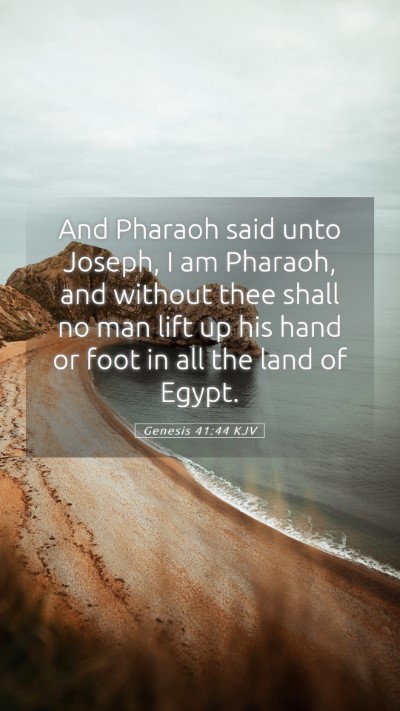Understanding Genesis 41:44: A Comprehensive Bible Verse Commentary
Genesis 41:44 states, “And Pharaoh said to Joseph, ‘I am Pharaoh, and without your consent no one shall lift up hand or foot in all the land of Egypt.’” This verse occurs in the context of Joseph's rise to power in Egypt after interpreting Pharaoh's dreams. It highlights the authority granted to Joseph and the trust Pharaoh places in him, signifying the importance of divine providence and human agency in God's plan.
Bible Verse Meanings and Interpretations
This verse is pivotal in understanding Joseph's role in Egypt, marking a shift from a prisoner to a position of immense power. The strong words of Pharaoh emphasize Joseph's extraordinary favor, which can be understood through several layers:
- Divine Favor: As highlighted in Matthew Henry’s Commentary, Joseph’s promotion is attributed to God's hand in his life, reflecting the overarching theme of providence. God orchestrated circumstances and used Joseph's hardships to prepare him for leadership.
- Human Responsibility: Albert Barnes emphasizes Joseph's integrity and wisdom, which won Pharaoh’s trust. Joseph did not just wait on God’s favor; he actively interpreted dreams and managed the crisis, underscoring the balance between divine help and human action.
- Authority and Leadership: According to Adam Clarke, Pharaoh's declaration showcases the absolute control and centralized power in Egypt at that time. The phrase “no one shall lift up hand or foot” signifies total reliance on Joseph’s governance.
In-Depth Bible Verse Analysis
Genesis 41:44 encapsulates the culmination of numerous events in Joseph's life, moving from betrayal by his brothers to becoming the savior of nations during famine. This verse urges us to consider how God can elevate individuals through trials. For readers delving into Bible verse explanations, this passage serves as a crucial reminder of God's sovereignty in shaping history.
Historical Context of the Verse
This verse emerges in a historical period of Egypt marked by significant famine, as interpreted in previous chapters. It lends insight into the socio-political dynamics of ancient Egypt, illustrating the role of a vizier—Joseph's title—and how it connected with Pharaoh's rule.
Application of the Verse in Daily Life
For modern believers, Genesis 41:44 can serve as a powerful lesson in trust. It urges individuals to recognize how God places them in specific positions for greater purposes. In Bible study groups or online Bible study sessions, this verse can lead to discussions about faith, God’s plans, and individual roles in society.
Cross References
- Genesis 37:28 – Joseph sold into slavery, highlighting the backstory of his trials.
- Genesis 39:2-6 – Joseph’s rise in Potiphar's house reflects his favor even in adversity.
- Genesis 40:14-15 – Joseph’s interpretation of dreams sets the stage for his encounter with Pharaoh.
- Proverbs 21:1 – The heart of a king is in the hand of the Lord, demonstrating divine control over earthly authorities.
Conclusion: Meaning of Genesis 41:44
Genesis 41:44 serves as a profound reminder of God’s ability to elevate individuals for His purposes. It illustrates key principles such as divine providence, the importance of human integrity, and the establishment of authority. Engaging with this verse allows for deeper Bible verse understanding and encourages believers to trust in God’s plans through the complexities of their own lives.
Further Bible Study Insights
For those interested in Bible study lessons, it is fruitful to explore how different characters respond to trials. This can include discussions on the significance of Joseph's journey and how it prefigures themes found in the New Testament, such as redemption and sovereignty in Christ.


